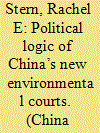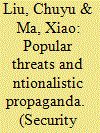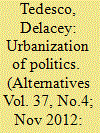| Srl | Item |
| 1 |
ID:
144368


|
|
|
|
|
| Summary/Abstract |
China boasts over 130 environmental courts opened between 2007 and 2013, a trend that promises to re-shape environmental law. What accounts for the political appeal of specialized justice? Overall, China’s specialized environmental courts are a method for local officials to signal commitment to environmental protection and a forum to defuse potentially explosive disputes. They symbolize the increasing importance placed by China’s leaders on environmental issues, while also offering welcome flexibility. Courts can accept cases when disputes are rising, and turn them away when local power holders are involved and caution appears prudent. Many courts struggle to find enough cases to survive, and even the most active courts do not necessarily tackle China’s most pressing environmental problems. A new analysis shows that the Guiyang court’s docket is dominated by minor criminal cases—crackdowns against powerless rural residents, rather than more ambitious attempts to hold polluters accountable.
|
|
|
|
|
|
|
|
|
|
|
|
|
|
|
|
| 2 |
ID:
163249


|
|
|
|
|
| Summary/Abstract |
Conventional wisdom suggests that authoritarian leaders use nationalist propaganda as a tool to strengthen mass support. Yet few studies have provided systematic evidence to account for specific tactics underlying these information manipulations. We argue that autocrats, recognizing the material costs of propaganda, are more likely to target localities with the greatest antiregime potential. Using a unique dataset of “patriotic education sites” that the Chinese Communist Party assigned throughout China as tools to advance its nationalistic campaign, we found a systematic association between these locations and the scale of antiregime mobilization in the 1989 prodemocracy movement. The longer the antiregime protest lasted in a city in 1989, the greater the number of patriotic education sites the city contains. Our findings highlight the strategic way in which autocrats manipulate nationalist propaganda to mitigate popular threats.
|
|
|
|
|
|
|
|
|
|
|
|
|
|
|
|
| 3 |
ID:
117871


|
|
|
|
|
| Publication |
2012.
|
| Summary/Abstract |
If we live, as we are told, in an urbanizing world, then the problem of contemporary political analysis must be tackled by rethinking politics as practices of urbanizing spaces and subjectivities. This article questions whether relational ontologies of urban spatiotemporality and spatialized inter-subjectivity are sufficient as bases for analyses of the contemporary forms of politics enacted within practices and processes of urbanization. I argue that they are not, and suggest instead that urbanization puts into play multiple, overlapping aporetic boundaries between nature and culture, rural and urban, nature and urban, and ultimately between politics and its limits.
|
|
|
|
|
|
|
|
|
|
|
|
|
|
|
|